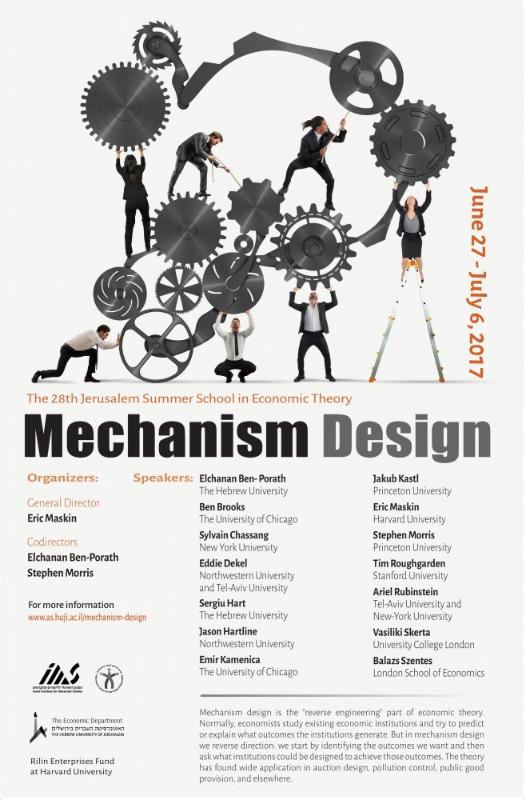General Director:
Eric Maskin (Harvard University)
Organizers:
Elchanan Ben-Porath, Codirector (The Hebrew University)
Stephen Morris (Princeton University)
Mechanism design is the “reverse engineering” part of economic theory. Normally, economists study existing economic institutions and try to predict or explain what outcomes the institutions generate. But in mechanism design we reverse direction: we start by identifying the outcomes we want and then ask what institutions could be designed to achieve those outcomes. The theory has found wide application in auction design, pollution control, public good provision, and elsewhere.
List of speakers:
Elchanan Ben- Porath, The Hebrew University of Jerusalem
Ben Brooks, The University of Chicago
Sylvain Chassang, New York University
Eddie Dekel, Northwestern University and Tel-Aviv University
Sergiu Hart, The Hebrew University
Jason Hartline, Northwestern University
Emir Kamenica, The University of Chicago
Jakub Kastl, Princeton University
Eric Maskin, Harvard University
Stephen Morris, Princeton University
Tim Roughgarden, Stanford University
Ariel Rubinstein, Tel-Aviv University and New-York University
Vasiliki Skreta, University College London
Balazs Szentes, London School of Economics


General Director:
Eric Maskin (Harvard University)
Organizers:
Elchanan Ben-Porath, Codirector (The Hebrew University)
Stephen Morris (Princeton University)
Mechanism design is the “reverse engineering” part of economic theory. Normally, economists study existing economic institutions and try to predict or explain what outcomes the institutions generate. But in mechanism design we reverse direction: we start by identifying the outcomes we want and then ask what institutions could be designed to achieve those outcomes. The theory has found wide application in auction design, pollution control, public good provision, and elsewhere.
List of speakers:
Elchanan Ben- Porath, The Hebrew University of Jerusalem
Ben Brooks, The University of Chicago
Sylvain Chassang, New York University
Eddie Dekel, Northwestern University and Tel-Aviv University
Sergiu Hart, The Hebrew University
Jason Hartline, Northwestern University
Emir Kamenica, The University of Chicago
Jakub Kastl, Princeton University
Eric Maskin, Harvard University
Stephen Morris, Princeton University
Tim Roughgarden, Stanford University
Ariel Rubinstein, Tel-Aviv University and New-York University
Vasiliki Skreta, University College London
Balazs Szentes, London School of Economics


Jun 27, 2017
General Director:
Eric Maskin (Harvard University)
Organizers:
Elchanan Ben-Porath, Codirector (The Hebrew University)
Stephen Morris (Princeton University)
Mechanism design is the “reverse engineering” part of economic theory. Normally, economists study existing economic institutions and try to predict or explain what outcomes the institutions generate. But in mechanism design we reverse direction: we start by identifying the outcomes we want and then ask what institutions could be designed to achieve those outcomes. The theory has found wide application in auction design, pollution control, public good provision, and elsewhere.
List of speakers:
Elchanan Ben- Porath, The Hebrew University of Jerusalem
Ben Brooks, The University of Chicago
Sylvain Chassang, New York University
Eddie Dekel, Northwestern University and Tel-Aviv University
Sergiu Hart, The Hebrew University
Jason Hartline, Northwestern University
Emir Kamenica, The University of Chicago
Jakub Kastl, Princeton University
Eric Maskin, Harvard University
Stephen Morris, Princeton University
Tim Roughgarden, Stanford University
Ariel Rubinstein, Tel-Aviv University and New-York University
Vasiliki Skreta, University College London
Balazs Szentes, London School of Economics

Jun 27, 2017
General Director:
Eric Maskin (Harvard University)
Organizers:
Elchanan Ben-Porath, Codirector (The Hebrew University)
Stephen Morris (Princeton University)
Mechanism design is the “reverse engineering” part of economic theory. Normally, economists study existing economic institutions and try to predict or explain what outcomes the institutions generate. But in mechanism design we reverse direction: we start by identifying the outcomes we want and then ask what institutions could be designed to achieve those outcomes. The theory has found wide application in auction design, pollution control, public good provision, and elsewhere.
List of speakers:
Elchanan Ben- Porath, The Hebrew University of Jerusalem
Ben Brooks, The University of Chicago
Sylvain Chassang, New York University
Eddie Dekel, Northwestern University and Tel-Aviv University
Sergiu Hart, The Hebrew University
Jason Hartline, Northwestern University
Emir Kamenica, The University of Chicago
Jakub Kastl, Princeton University
Eric Maskin, Harvard University
Stephen Morris, Princeton University
Tim Roughgarden, Stanford University
Ariel Rubinstein, Tel-Aviv University and New-York University
Vasiliki Skreta, University College London
Balazs Szentes, London School of Economics

